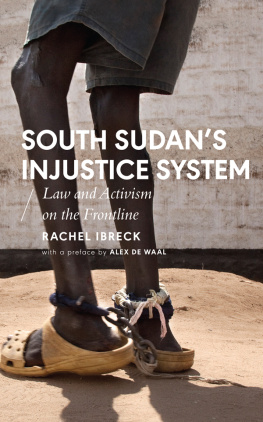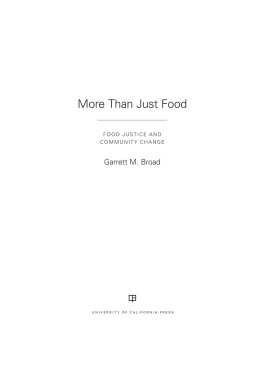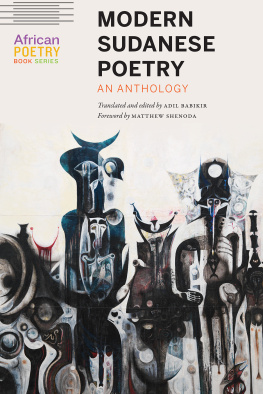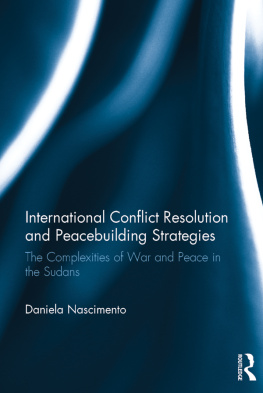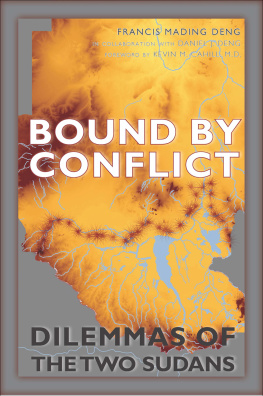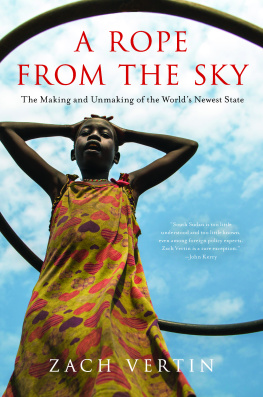
African Arguments
Written by experts with an unrivalled knowledge of the continent, African Arguments is a series of concise, engaging books that address the key issues currently facing Africa. Topical and thought-provoking, accessible but in-depth, they provide essential reading for anyone interested in getting to the heart of both why contemporary Africa is the way it is and how it is changing.
African Arguments Online
African Arguments Online is a website managed by the Royal African Society, which hosts debates on the African Arguments series and other topical issues that affect Africa: http://africanarguments.org
Series editors
Adam Branch, University of Cambridge
Alex de Waal, World Peace Foundation
Richard Dowden, journalist and author
Alcinda Honwana, Open University
Ebenezer Obadare, University of Kansas
Carlos Oya, SOAS, University of London
Managing editor
Stephanie Kitchen, International African Institute
Titles already published
Alex de Waal, AIDS and Power
Tim Allen, Trial Justice
Raymond W. Copson, The United States in Africa
Chris Alden, China in Africa
Tom Porteous, Britain in Africa
Julie Flint and Alex de Waal, Darfur: A New History of a Long War
Jonathan Glennie, The Trouble with Aid
Peter Uvin, Life after Violence: A Peoples Story of Burundi
Bronwen Manby, Struggles for Citizenship in Africa
Camilla Toulmin, Climate Change in Africa
Orla Ryan, Chocolate Nations
Theodore Trefon, Congo Masquerade
Lonce Ndikumana and James Boyce, Africas Odious Debts
Mary Harper, Getting Somalia Wrong?
Neil Carrier and Gernot Klantschnig, Africa and the War on Drugs
Alcinda Honwana, Youth and Revolution in Tunisia
Marc Epprecht, Sexuality and Social Justice in Africa
Lorenzo Cotula, The Great African Land Grab?
Michael Deibert, The Democratic Republic of Congo
Adam Branch and Zachariah Mampilly, Africa Uprising
Celeste Hicks, Africas New Oil
Morten Jerven, Africa: Why Economists Get it Wrong
Theodore Trefon, Congos Environmental Paradox
Paul Richards, Ebola: How a Peoples Science Helped End an Epidemic
Louisa Lombard, State of Rebellion
Kris Berwouts, Congos Violent Peace
Hilary Matfess, Women and the War on Boko Haram
Celeste Hicks, The Trial of Hissne Habr
Mick Moore, Wilson Prichard and Odd-Helge Fjeldstad, Taxing Africa
Nanjala Nyabola, Digital Democracy, Analogue Politics
Ebenezer Obadare, Pentecostal Republic
Forthcoming titles
Yotam Gidron: Israel in Africa
Published by Zed Books and the IAI with the support of the following organisations:
The principal aim of the International African Institute is to promote scholarly understanding of Africa, notably its changing societies, cultures and languages. Founded in 1926 and based in London, it supports a range of seminars and publications including the journal Africa .
www.internationalafricaninstitute.org
The Royal African Society is a membership organisation that provides opportunities for people to connect, celebrate and engage critically with a wide range of topics and ideas about Africa today. Through events, publications and digital channels it shares insight, instigates debate and facilitates mutual understanding between the UK and Africa. The society amplifies African voices and interest in academia, business, politics, the arts and education, reaching a network of more than one million people globally.
www.royalafricansociety.org
The World Peace Foundation , founded in 1910, is located at the Fletcher School, Tufts University. The Foundations mission is to promote innovative research and teaching, believing that these are critical to the challenges of making peace around the world, and should go hand in hand with advocacy and practical engagement with the toughest issues. Its central theme is reinventing peace for the twenty-first century.
www.worldpeacefoundation.org
About the author
Rachel Ibreck is a Lecturer in Politics and International Relations at Goldsmiths, University of London. She holds a PhD in Politics and International Relations from the University of Bristol. Her research explores struggles for human rights, memory and justice in settings affected by conflict and atrocity in Africa, especially Rwanda and South Sudan. She has published in scholarly journals including African Affairs , the Journal of Intervention and Statebuilding , the Journal of Contemporary African Studies and Stability . She formerly worked in human rights advocacy, including for Justice Africa . She is also a research associate at the Conflict Research Programme at the London School of Economics and Political Science.
SOUTH SUDANS INJUSTICE SYSTEM
LAW AND ACTIVISM ON THE FRONTLINE
RACHEL IBRECK

| In association with International African Institute Royal African Society World Peace Foundation |
South Sudans Injustice System: Law and activism on the frontline was first published in 2019 by Zed Books Ltd, The Foundry, 17 Oval Way, London SE11 5RR, UK
www.zedbooks.net
Copyright Rachel Ibreck 2019
The right of Rachel Ibreck to be identified as the author of this work have been asserted by her in accordance with the Copyright, Designs and Patents Act, 1988
Typeset in Haarlemmer by seagulls.net
Index: John Barker
Cover design: Jonathan Pelham
Cover photo Fernando Moleres, Panos Pictures
Printed and bound by CPI Group (UK) Ltd, Croydon, CR0 4YY
All rights reserved. No part of this publication may be reproduced, stored in a retrieval system or transmitted in any form or by any means, electronic, mechanical, photocopying or otherwise, without the prior permission of Zed Books Ltd.
A catalogue record for this book is available from the British Library
ISBN 978-1-78699-340-3 hb
ISBN 978-1-78699-339-7 pb
ISBN 978-1-78699-341-0 pdf
ISBN 978-1-78699-342-7 epub
ISBN 978-1-78699-343-4 mobi
For the children of the South Sudanese court observation team.
May they read it in peaceful times.
CONTENTS
This book emerged from a unique court observation research project involving a team of South Sudanese lawyers, paralegals and civil society activists. The idea to undertake the court observations came from a South Sudanese human rights lawyer who was handling sensitive cases in courts and prisons in Juba for most of the civil war, until he was forced to flee in January 2018. The suggestion that we should present the research findings in a book came from a South Sudanese paralegal, who recently graduated from law school, after having completed his degree during the war while living in a camp for displaced people under the protection of the United Nations. Neither these two individuals, nor any of the other 18 researchers involved in the project can be fully named here due to concerns about their security, so I will instead include them all with the initials which appear on their court reports. The book draws extensively on the work of: AJS, AKB, AMA, AW, BAB, BKY, BT, EJJ, GW, GP, JTA, LBN, SRM, TL, NG, OGL, OSM, PWG, WN and GVB. I deeply thank them. I hope that the book can be of some value for them, and that they will have other future opportunities to share their insights and pursue their ambitions. They should be fully credited for their role in this collaborative research and acknowledged for the everyday work they do for justice in their communities and the nation of South Sudan.
Next page
